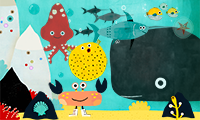

Welcome! This area is dedicated to the progress of your child's learning.
You can stay up to date on what he is learning!
If you have already downloaded a Little Smiling Minds application and have entered your e-mail to access the parent area, enter here the same e-mail address and the password we sent you.
If you haven't yet discovered the applications, download them here.
Report Area
Little Smiling Minds is an educational project that aims to develop children's cognitive functions to the utmost, by using games and applying the latest scientific knowledge in the field of education and cognitive psychology. Learning is an active process and exercising can be a game!
Many scenarios, to immerse yourself in a fun path to learning.
Accompanied by animal friends, the child exercises his capabilities in the most natural, simple and effective way.
The frog, the spider, the squirrel, the fox and the owl will bring you to discover the forest of numbers.


CountOnSea
Keep on learning to play with numbers even in the middle of the sea with lots of games
For children aged 3 years and up

CountOnSavannah
Who said the lion doesn't do his sums? Come and discover the savannah of numbers!
For children aged 3 years and up
Little Smiling Minds applications are created on the basis of the latest studies on the development of the abilities of the human mind. Thanks to their specific structure, the quantity of games, and the gradual progression of the exercises they contain, they can increase the cognitive "functional" abilities of children.
read more